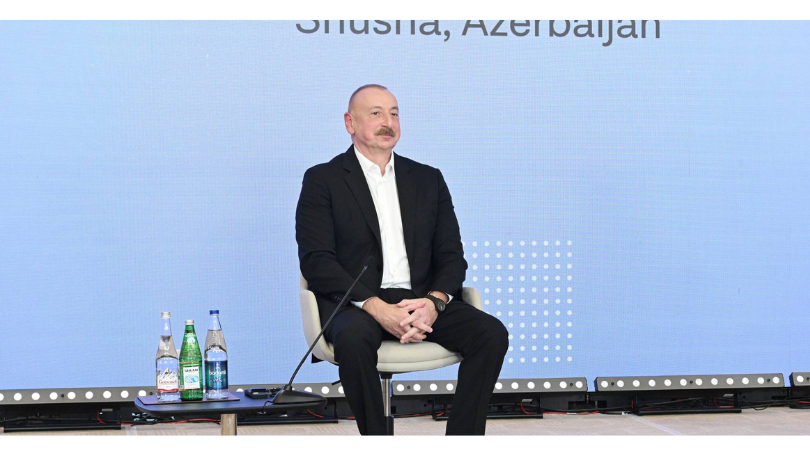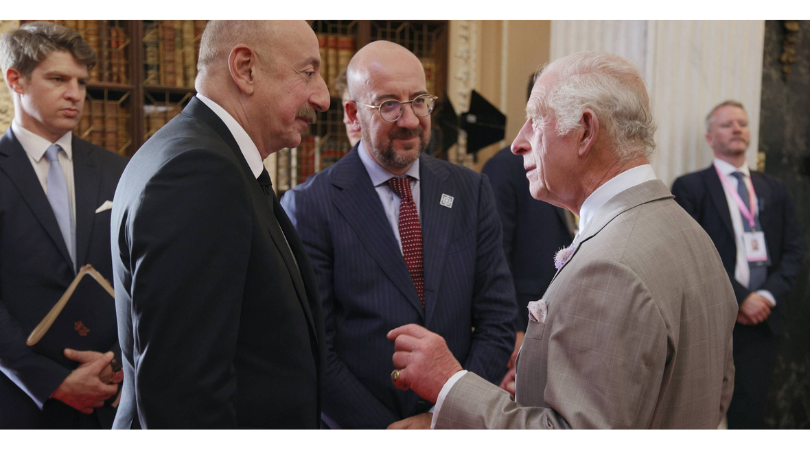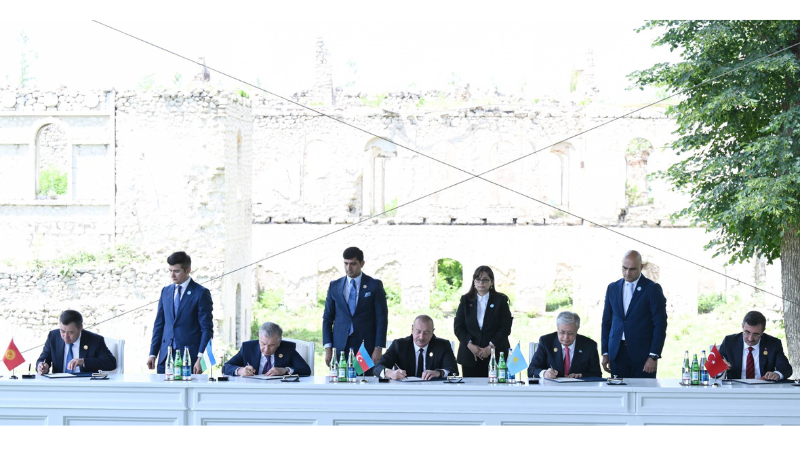SOCAR: It is impossible to stop the Southern Gas Corridor
2015-05-26
To imagine that a project like Turkish Stream could ruin the Southern Gas Corridor is complete nonsense. Unlike the Gazprom project, the Southern Gas Corridor is about billions of dollars already being invested, Vitaly Baylarbayov, deputy Vice President of SOCAR told EurActiv in an exclusive interview.
Vitaly Baylarbayov has been in charge of the Southern Gas Corridor, the only alternative project to bring gas to Europe from a source other than Russia, during the last eight years. He spoke to EurActiv’s Senior Editor, Georgi Gotev.
SOCAR is sponsoring the Baku 2015 European Games. Are you interested promoting your company in the EU, in relation to the Southern Gas Corridor, in which SOCAR is the key shareholder?
The Southern Gas Corridor is not at all a project aimed at our promotion. It is not a political project, it is strictly a commercial project. We are realising the project with our international partners. You can see from this map, the respective companies are from Asia, from Europe, from the Western world and from the world that we call Oriental. There is also a Russian company, Lukoil, which is a shareholder in the Shah Deniz 2 gas field, there is an Iranian company, NICO, the British company BP, Petronas from Malaysia and (the) Turkish TPAO.
Regarding our European customers, basically all are major European companies: Shell, Gaz de France, Gas Natural of Spain, the Italian companies ENEL and Hera – the geography is huge. Here advertising doesn’t work. What works are the principles of business. Nobody would (take on) a $45 billion project of pipelines and of offshore gas pumping at Shah Deniz 2 if they are not certain that the project is feasible, that it is realistic and that deadlines will be kept. The deadline is 2018 for the start of producing at Shah Deniz 2. In 2018, this gas will start flowing to Turkey, to Eskişehir. In the beginning of 2020, our customers in Greece, Bulgaria and Italy will start receiving gas originating from Shah Deniz.
The project has been prepared over many years. The final investment decision was taken in December 2013, and the gas supply contracts that were signed are also very long-term, up to 25 years. In recent years, no one has been able to agree on such long-term contracts, neither Russia, nor Norway, nor suppliers from North Africa. We succeeded because we were able to convince our European partners that Azerbaijan is a partner to be trusted. The contracts are binding, on the one hand regarding supplies, on the other side regarding purchase, and also on our side, the guarantee of transportation.
Our track record has also helped to convince our partners that the projects we undertake are serious, that we are keeping our commitments. For the last few years, Georgia has received, almost exclusively, gas from Azerbaijan, to the benefit of this small country and its economy, not for the purpose of establishing a monopoly. We could have used this to act like a monopolist, but we didn’t and I’m convinced that we would never do such a thing in a future to any of our customers.
We also have been a reliable gas supplier to Turkey over the years, and this too has helped build our reputation.
You argue that the Southern Gas Corridor is a commercial project, but the Gazprom-favoured Turkish Stream project appears to be a political project, most probably aimed to stop the Southern Gas Corridor. How would you comment?
A pipeline with this or another name is a personal matter for those who intend to build it, including its investors, originators, the countries through which it would run, and its prospective clients. If they think that the project is bankable, and if the project is built in accordance to the norms and regulations of the respective countries, then why not build it?
Is this project aimed against another one? I don’t think so. I think that the markets toward which we are targeted with our Southern Gas Corridor and those targeted by such pipelines are attractive enough. And if the attractiveness is such that even five pipelines be built, let it be!
But to imagine that a pipeline could ruin our Southern Gas Corridor, that’s complete nonsense. The Southern Gas Corridor is not just a set of signed agreements, it’s about billions of dollars already being invested. We already committed to investing in the offshore Shah Deniz gas field in the Caspian Sea and in the pipelines on the territory of Azerbaijan and Georgia 12 billion dollars. These are contractual obligations already materialised. This is money that is already in use. 30% of the work that needs to be completed in the Caspian, in Azerbaijan and in Georgia is already done. To stop such a project is impossible. We cannot stop it. Our partners cannot stop it, nobody can stop it – it’s impossible. Commercially this is unfeasible.
We undertook commitments with our clients in Europe, and our clients committed to us. If we gave up, there would be penalties; we are speaking of billions. And if our clients do not buy our gas as we have agreed, the penalties, for them, [would be similar]. The Southern Gas Corridor is an absolute reality. It’s a reality you can actually see in Azerbaijan, in Georgia, with the first pipes being laid down underground. It’s a reality in Turkey, where preparation for the laying of pipes is underway, and the first batches of 56` pipes are already been arrived from mills and ready to be layed. So forget it. This project cannot be stopped.
But is it possible to build another pipe? Of course. Is it necessary to build one? This question is not for me. It’s a question to be asked to those who want to build it. In any case, the companies that want to build Turkish Stream are also bound by balance sheets, have to justify their investments, and the activity of which, at least I hope, will be rewarded by the economic returns of the project.
You are too diplomatic. One doesn’t need an expert to doubt that the successive Gazprom pipeline projects, South Stream and Turkish Stream, are bankable. From my perspective, South Stream has been designed to compete against Nabucco, and now Turkish Stream is designed against the Southern Gas Corridor.
It’s not my habit to comment on other peoples’ lives. It’s their business. But Nabucco was not selected by the Shah Deniz partners without any reference to the South Stream Project.
But how much time is needed for a project such as Turkish Stream to come to life? Experts have told me that since we speak of a completely new route, this would need at least ten years…
You know, I joined work on the Southern Gas Corridor in 2007. And it doesn’t mean that work on the Southern Gas Corridor hadn’t already started. It’s at least 9 years since the Southern Gas Corridor, under another name, has been in preparation. Yes, a cycle of 8-10 years is necessary to bring such large scale projects to life.
But having said this, maybe some work has already been done. But once again, it’s not my job to comment other peoples’ projects.
Can you comment on the next phases of the Southern Gas Corridor? I’m referring to this map which appears to show the project in the future.
This is a project which continues to develop dynamically and we, those who have worked so far, will continue to help it grow further.
The future of this corridor is interesting enough, and is linked to the diversification of gas sources. New sources of gas are the Absheron offshore gas field, where the investors are Total and Gaz de France. And Azerbaijani fields Inam and Babek will have investors who are not yet determined. This is diversification at the scale of Azerbaijan. It could add at least an additional 10 billion of cubic metres of gas per year (bcm/y) to the Corridor.
But diversification will come also from other countries. Gas from Central Asia is more and more frequently mentioned as the next major source of diversification of supplies through the Southern Gas Corridor. But in this case, it would be more precise to speak about further expansion of the capacity of the Southern Gas Corridor.
Russia could perhaps obstruct such a project, due to the unfinished delimitation of the Caspian Sea?
If there is a business interest, companies, governments will find a solution. In Azerbaijan we don’t see an obstacle for bringing gas from Turkmenistan under the Caspian Sea. We recognise that the borders of the sectors between Azerbaijan and Turkmenistan have not been delimited. But laying down a pipe doesn’t in any way interfere with the legal status. It doesn’t matter on which seabed the pipe is running, fees and taxes are not due offshore.
It’s another issue if everyone would be happy, or some will be unhappy, if this pipe is built. But not only gas from Turkmenistan can run through the Southern Gas Corridor. There is gas in Iran, and very much gas. This is the country with the second largest reserves in the world. And there is a lot of gas in Iraq and Syria. And there is now gas in Israel, and there is gas in Cyprus.
It is regrettable when such pipeline projects are not implemented, because they are like bridges, linking people together, linking Asia to Azerbaijan, Azerbaijan to Turkey and Turkey to Europe. It’s like a highway to future progress. If they don’t happen soon, they will materialise later. I don’t care which one will come first, it’s important that thanks to these developments, on one side of the pipe people would feel safer, warmer and pay less, and on the other side it will make the lives of people richer, better, nicer. And the transit countries will benefit as well. Everyone would be a winner.




















